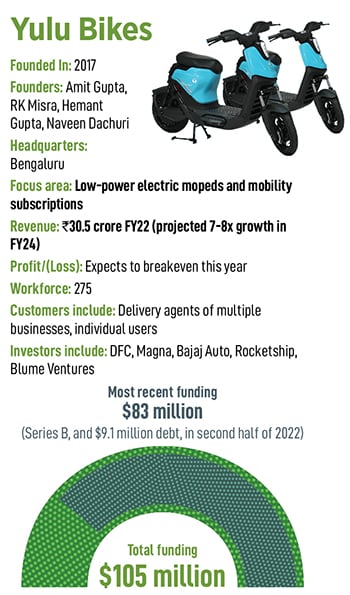Yulu Bikes: Simplifying mobility one component at a time
With Yuma Energy, the company is expanding into battery-as-a-service and with Yulu Wynn, getting into the OEM space


Even though Covid was brutal for startups in the mobility space in India, it also opened up new needs from both consumers and businesses that presented opportunities.
That was indeed the case for Amit Gupta and his three friends and co-founders at Yulu Bikes. It showed them there was opportunity to offer long-term rentals and even sell their low-powered mopeds to consumers, whereas, anecdotally, one often sees delivery agents scooting along on these two-wheelers that don’t need a driving licence because of their under-25 kmph top speed rating.
Last year, the entrepreneurs at Yulu also saw an opportunity to build an energy business in parallel, called Yuma Energy, starting with battery-swapping, but aspiring to play a role in the larger energy transition India is undergoing.

This new business got support from Magna, a large American auto components supplier, that led Yulu’s latest round of funding, adding $83 million in Series B investment.
When it was announced in February, Yuma, a joint venture with Magna, had a network of some 85 Yuma stations in Bengaluru, Mumbai and Delhi, with plans to hit 500 stations, adding more cities, by the end of 2023.
Yuma stations are densely located in high-demand areas and are equipped with integrated artificial intelligence (AI)-powered charging units. “Yulu is Yuma’s first customer," Gupta says. The battery-as-a-service business is open to other EV players as well.
At Yulu itself, the company expects to go from about 25,000 mopeds currently to about 100,000 by June or so next year, and expanding not by cities necessarily but “pin code by pin code", tapping locations where the demand is the most dense, Gupta says.
Yulu is available in three makes. The Yulu Dex is the one with a carrier and other accoutrements that help the delivery people. The Yulu Miracle was aimed at the individual consumer who would go from point A to point B, finding and using the vehicle via the Yulu smartphone app.

Now the Yulu Wynn, made by Bajaj Auto, is a more stylish version of the Miracle that’s available for purchase for about ₹55,000 upfront. And then one has to opt for a subscription plan that covers the battery and the mobility and connectivity features. Currently, Yulu offers three plans, at ₹600, ₹700 and ₹900 per month.
Gupta expects revenue this year to be 7-8x higher over the last and for Yulu to hit breakeven by December.
First Published: Sep 28, 2023, 14:35
Subscribe Now